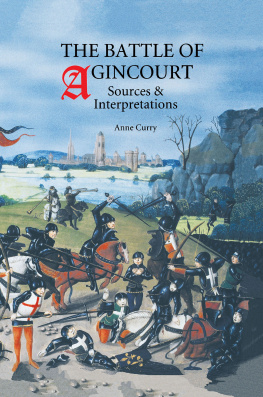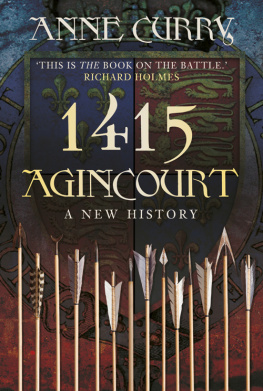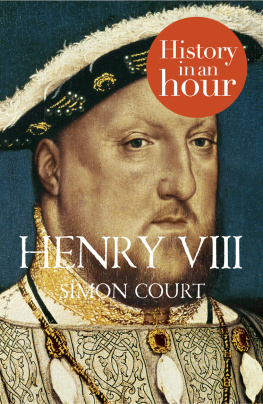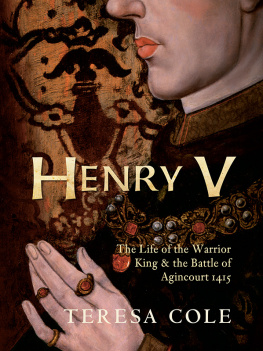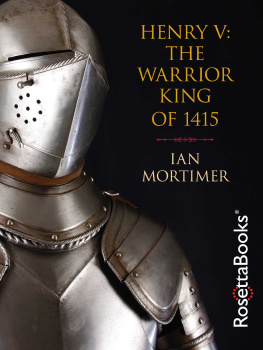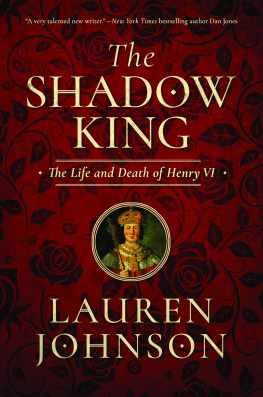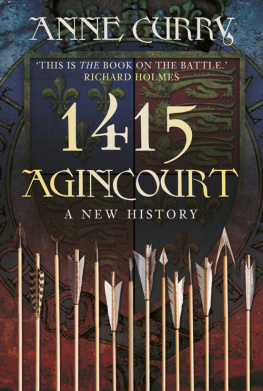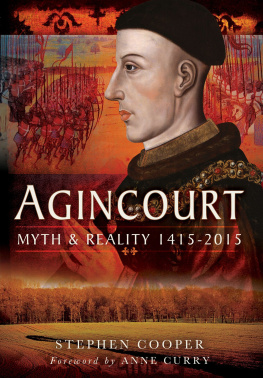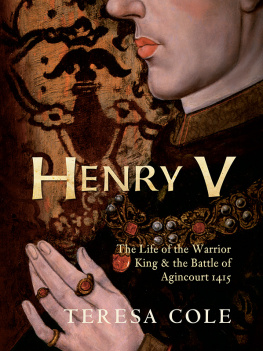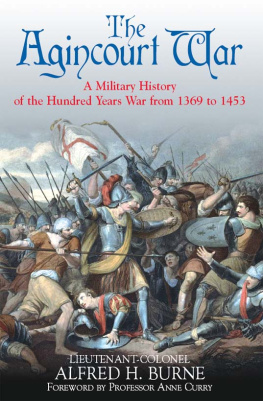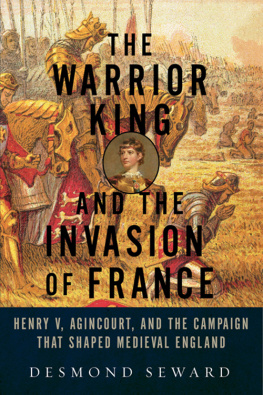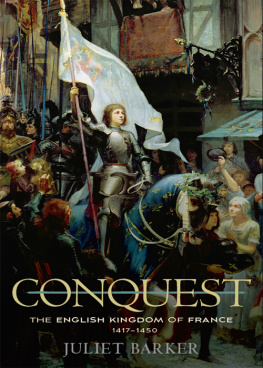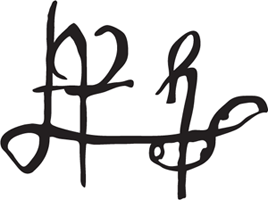Contents
Anne Curry
HENRY V
Playboy Prince to Warrior King
ALLEN LANE
UK | USA | Canada | Ireland | Australia
India | New Zealand | South Africa
Penguin Books is part of the Penguin Random House group of companies whose addresses can be found at global.penguinrandomhouse.com.
First published 2015
Copyright Anne Curry, 2015
Cover design by Pentagram
Jacket art by Adam Simpson
The moral right of the author has been asserted
ISBN: 978-0-141-97872-7
THE BEGINNING
Let the conversation begin...
Follow the Penguin Twitter.com@penguinukbooks
Keep up-to-date with all our stories YouTube.com/penguinbooks
Pin Penguin Books to your Pinterest
Like Penguin Books on Facebook.com/penguinbooks
Listen to Penguin at SoundCloud.com/penguin-books
Find out more about the author and
discover more stories like this at Penguin.co.uk
Penguin Monarchs
THE HOUSES OF WESSEX AND DENMARK
| Athelstan | Tom Holland |
| Aethelred the Unready | Richard Abels |
| Cnut | Ryan Lavelle |
| Edward the Confessor | James Campbell |
THE HOUSES OF NORMANDY, BLOIS AND ANJOU
| William I | Marc Morris |
| William II | John Gillingham |
| Henry I | Edmund King |
| Stephen | Carl Watkins |
| Henry II | Richard Barber |
| Richard I | Thomas Asbridge |
| John | Nicholas Vincent |
THE HOUSE OF PLANTAGENET
| Henry III | Stephen Church |
| Edward I | Andy King |
| Edward II | Christopher Given-Wilson |
| Edward III | Jonathan Sumption |
| Richard II | Laura Ashe |
THE HOUSES OF LANCASTER AND YORK
| Henry IV | Catherine Nall |
| Henry V | Anne Curry |
| Henry VI | James Ross |
| Edward IV | A. J. Pollard |
| Edward V | Thomas Penn |
| Richard III | Rosemary Horrox |
THE HOUSE OF TUDOR
| Henry VII | Sean Cunningham |
| Henry VIII | John Guy |
| Edward VI | Stephen Alford |
| Mary I | John Edwards |
| Elizabeth I | Helen Castor |
THE HOUSE OF STUART
| James I | Thomas Cogswell |
| Charles I | Mark Kishlansky |
| [ Cromwell | David Horspool ] |
| Charles II | Clare Jackson |
| James II | David Womersley |
| William III & Mary II | Jonathan Keates |
| Anne | Richard Hewlings |
THE HOUSE OF HANOVER
| George I | Tim Blanning |
| George II | Norman Davies |
| George III | Amanda Foreman |
| George IV | Stella Tillyard |
| William IV | Roger Knight |
| Victoria | Jane Ridley |
THE HOUSES OF SAXE-COBURG & GOTHA AND WINDSOR
| Edward VII | Richard Davenport-Hines |
| George V | David Cannadine |
| Edward VIII | Piers Brendon |
| George VI | Philip Ziegler |
| Elizabeth II | Douglas Hurd |
Introduction
On 2 December 1420, the Chancellor of England, Thomas Langley, Bishop of Durham, addressed the assembled Lords and Commons at the opening of Parliament at Westminster. We people of England, he began, have very special reason to honour and thank Almighty God. The reason, as nobody present would have needed reminding, was the high grace, victory and achievement that God had granted to Englands king, Henry V. Langley enumerated these achievements: the suppression of the Welsh rebellion in his youth, and later, when king, the destruction of heresies and Lollardy within the kingdom. But Henry Vs crowning glory, sealed by the Treaty of Troyes some eight months before, on 21 May, was
the recovery of ancient rights pertaining to his crown of England in France and in the blessed conclusion of peace and unity between him and his former adversary of France to the glorious pleasure of God and to the undoubted advantage and happiness of all this kingdom of England.
At the eastern French city of Troyes, Charles VI of France had recognized Henry V of England as his rightful heir. By the treaty terms, on Charless death Henry would become King of France and in doing so he would turn the dream of English kings, ever since Edward III declared himself King of France in 1340, into reality. In the meantime, Henry would be regent for the mentally and physically ailing Charles, whose daughter Catherine he married two weeks after the signing of the treaty, on 2 June. Once Henry succeeded his father-in-law, and for all time to come, the two thrones of England and France would be united under the same ruler. The treaty ordered an immediate end to all animosity between the two realms and their peoples, a remarkable outcome when the last two centuries had been dominated by war between England and France.
Then, the unexpected happened. On 31 August 1422, just twenty-one months after Langleys encomium to Parliament, Henry V, aged almost thirty-six, died from the bloody flux at the great fortress of Vincennes, east of Paris. Predeceasing Charles by six weeks, he was the first English king to die overseas since Richard I over two centuries earlier. His nine-month-old son by Catherine, Henry VI, was recognized as King of France following Charless death, but Henry VI would prove as ineffective as his father had been assertive: within thirty years the English had been removed from French soil, save for a toehold at Calais. Henry Vs double monarchy had failed.
Even so, in the popular imagination, Henry V remains as much a success story today as when Bishop Langley addressed Parliament in 1420. Indeed, he is often considered destined for greatness from the moment he came to the throne on 21 March 1413. His victory at Agincourt on 25 October 1415, still one of the most iconic English victories against a foreign enemy, achieved in the face of allegedly overwhelming odds, is viewed as the consequence of his astute leadership and personal bravery. Whats more, this view of Henry as a successful warrior-king, inspired and supported by God and beloved of his people, has been constant throughout history. It inspired two Latin prose lives of the king in the late 1430s. The first was the anonymous Vita et Gesta Henrici Quinti (The Life and Deeds of Henry the Fifth), commonly known as the Pseudo-Elmham since it was once thought, erroneously, to be the work of Thomas Elmham, a monk of St Augustines Abbey, Canterbury, who wrote a verse account of the opening years of the reign. The Pseudo-Elmham appears to have drawn information from Sir (later Lord) Walter Hungerford, much trusted by Henry as councillor and commander, and chosen by the king as one of the executors of his will and guardians of his infant son. The second Latin life of the 1430s was Tito Livio Frulovisis


